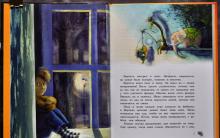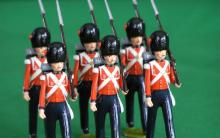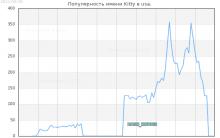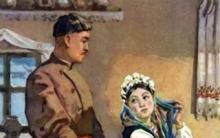Twenty-seventh of December.
Composition.
Bazarov is a “new man”.
(based on the novel by I. S. Turgenev “Fathers and Sons”).
I. S. Turgenev’s novel “Fathers and Sons” was created at a time when the question of the abolition of serfdom was raised, when there were contradictions between liberals and democrats. Just at this time - a time of political reforms and social upheavals, a new bourgeois-capitalist layer is emerging in Russia, and the ideology of nihilism is spreading among student youth. The novel reflected the struggle of two socio-political camps that had developed in Russia by the 60s of the 19th century. The writer showed a typical conflict of the era and raised a number of topical problems, in particular, the question of the character and role of the “new man” - a figure during the revolutionary situation of the 60s.
The exponent of the ideas of revolutionary democracy was Yevgeny Bazarov, the hero who is contrasted in the novel with the liberal nobility. He is the main and only exponent of democratic ideology. Bazarov is a new person, a representative of those young leaders who “want to fight,” “nihilists.” He is for a new life and remains true to his convictions to the end.
Turgenev wrote: “The main figure, Bazarov, was based on one personality of a young provincial doctor that struck me. This remarkable man embodied that barely born, still fermenting principle, which later received the name of nihilism. The impression this personality made on me was very strong and at the same time not entirely clear.” And in Turgenev’s new novel, the main character was a representative of those “new people”. Turgenev’s attitude towards the “new man” was, in his own words, not entirely clear: Bazarov was his “enemy”, to whom he felt an “involuntary attraction”. Explaining his work, Turgenev wrote: “My whole story is directed against the nobility as an advanced class.” "This is the triumph of democracy over aristocracy."
Bazarov is shown by Turgenev as a supporter of the most “complete and merciless denial.” Bazarov denies everything - and first of all autocracy, serfdom and religion. Everything that is generated by the ugly state of society. Turgenev said about Bazarov: “He is honest, truthful and a democrat to the last detail... if he is called a nihilist, then it should be read: revolutionary”
How Bazarov is depicted - the “new man”. A man of the people, the grandson of a sexton who plowed the land, the son of a poor district doctor, a student, Bazarov “possessed a special ability to arouse confidence in himself in lower people, although he never indulged them and treated them carelessly.”
Bazarov's democracy is clearly reflected in his speech, activities, character traits and worldview. Turgenev painted a memorable portrait of the commoner Bazarov: his face, “long and thin, with a wide forehead,... large greenish eyes and hanging sand-colored sideburns... was enlivened by a calm smile and expressed self-confidence and intelligence.” His gait is “firm and swiftly bold,” his long and thick dark-blond hair “did not hide the large bulges of his spacious skull.” He dresses simply and, unlike the aristocrat Pavel Petrovich, who “fiddled a lot with his toilet,” is pointedly careless about his “clothes.” He comes to the village to the Kirsanovs “in a long robe with tassels”; greeting Arkady’s father, he extends to him a “naked red hand,” which apparently has never seen gloves.
Bazarov speaks clearly and simply: “Evgeny Vasiliev,” he greets Arkady’s father; expresses his thoughts with stern and courageous directness, without any evasiveness, without forcing himself into feigned politeness. This is clearly evident from the assessments that he gives to the people of the hostile camp, the “feudal lords”: Pavel Petrovich is a dandy, an “archaic phenomenon”, an “idiot”; Nikolai Petrovich is a “good man”, but “his song is sung”; He says to Arkady: “You are a gentle soul, a slob...”; “...you haven’t even reached us yet...”
His interests are generally similar to the interests of the enlightened youth of that time: he is interested in natural sciences, reads the works of German “vulgar materialists” - keeps up with the times. Bazarov is a nihilist, that is, a person who does not take anything for granted and rejects authorities and principles. He denies Pushkin, and unfoundedly. In particular, he gets it from the romantic worldview: “nonsense, rottenness, artistry,” “just study the anatomy of the eye: where does this ... mysterious look come from?” According to Bazarov, all human troubles occur due to the unjust structure of society, and he completely denied the role of personality and individual psychology, believing that one human specimen is enough to judge everyone.
Bazarov went through a harsh, difficult school of life, which strengthened him. Bazarov graduated from the university, but he did not take “an extra penny” from his parents for his education. Bazarov owes his knowledge, and he has very extensive knowledge, to himself. That is why he proudly declares: “Every person must educate himself, well, at least like me, for example...”
Bazarov does not pursue comfort or material wealth: “You and him... don’t stand on ceremony. He’s a wonderful guy, so simple...”, says Arkady about him.
Bazarov is the enemy of abstract science, divorced from life. He is for science that would be understandable to the people. Bazarov is a worker of science, he is tireless in his experiments, completely absorbed in his favorite profession. Labor, constant activity is his “element”. Having arrived on vacation at the Kirsanovs' estate, he immediately gets to work: collecting herbariums, doing physical and chemical experiments. Bazarov treats those who live without doing anything with undisguised contempt.
The plot of the novel is based on Bazarov’s clash with the world of aristocrats. Turgenev immediately shows that Bazarov is a working man, he is alien to aristocratic etiquette and conventions. It is in the clash with various characters opposed to him that Bazarov’s remarkable traits are revealed: in disputes with Pavel Petrovich - maturity of mind, depth of judgment and irreconcilable hatred of lordship and slavery; in relationships with Arkady - the ability to attract young people to one’s side, to be a teacher, educator, honest and irreconcilable in friendship; in relation to Odintsova - the ability to deeply and truly love, integrity of nature, willpower and self-esteem.
Turgenev tests Bazarov first with love, then with death. He observes from the outside how his hero behaves in these situations. Love for Odintsova, an intelligent, proud, strong woman, a match for Bazarov himself, defeats the principles of nihilism (but he called love “garbage”, was contemptuous of romantic feelings, recognized only physiological love, but having fallen in love, he suddenly felt with fear the romance in yourself). In the dying scene, Bazarov is faithful to his ideals to the end, he is not broken, he proudly looks death in the eye - he came only to “clear a place for others.”
Bazarov's death is justified in its own way. Just as in love it was impossible to bring Bazarov to the “silence of bliss,” so in his intended business he had to remain at the level of not yet realized, nurtured and therefore limitless aspirations. Bazarov had to die in order to remain Bazarov. This is how Turgenev conveys the loneliness of his hero-forerunner. Bazarov's death is the end of his tragic life. Outwardly, this death seems accidental, but, in essence, it was the logical conclusion of Bazarov’s image. It is prepared by the entire course of the narrative. The hero's fatigue, loneliness and melancholy could not have had any other outcome. Bazarov dies completely alone. And only “two already decrepit old men - a husband and wife” come to the “small rural cemetery.”
The author creates the tragic meaning of the image in Bazarov: his loneliness, rejection of the world around him, mental discord - all this is combined in one hero. This is a heavy burden that not everyone can carry with the self-esteem that is inherent in Bazarov. In the novel, Bazarov does not have a single like-minded person. Only the caricatured figures of Sitnikov and Kukshina, and even Arkady, who in his youth was carried away by unusual ideas. Bazarov is lonely in his personal life. His old parents are almost afraid of him; in his relationship with Odintsova, he fails. Bazarov once told Arkady: “When I meet a person who would not give up in front of me, then I will change my opinion about myself.” And such a person was found - this is Odintsova.
As a true artist and creator, Turgenev was able to guess the mood of his time, the emergence of a new type, the type of democrat commoner, who replaced the noble intelligentsia. With the help of skillfully selected details, Turgenev creates the appearance of one of the “new people”. Bazarov is an independent nature, not bowing to any authority, but subjecting all thoughts to judgment. A revolution in Bazarov's soul occurs under the influence of tragic love for Odintsova - he begins to realize the presence of a romantic in his soul, which was previously unthinkable for him. Bazarov is capable of spiritual evolution, which is demonstrated by his feelings for Odintsova, as well as the death scene. In Bazarov's scenes of declaration of love, emotions prevail over reason.
I. S. Turgenev’s novel “Fathers and Sons” reflects a typical conflict of the 60s of the 19th century: the state of society after the abolition of serfdom, the clash of generations, the struggle of “fathers” and “children.” It raises a large number of problems, including the question of the role and purpose of the “new man” of that time.
Such a “new man” was Yevgeny Bazarov, a commoner of the 60s, contrasted in the novel with the liberal nobility.
I share the opinion of the critic who said: “Be that as it may, Bazarov is still defeated.” I. S. Turgenev himself does not directly state what point of view he adheres to, but we read the author’s position “between the lines.” Closer to I. S. Turgenev is, most likely, the worldview of Nikolai Petrovich Kirsanov, and not Evgeny Bazarov.
Bazarov's defeat is evidenced, first of all, by the denouement of the novel. The main conflict - internal - remains unchanged. The hero cannot abandon his ideology, his principles, but he is also unable to reject the laws of life. For example, Bazarov’s confidence and the correctness of his nihilistic theory were greatly weakened by the hero’s love for Anna Sergeevna Odintsova. “I love you stupidly, madly...” - this feeling does not lend itself to Bazarov’s logic. There is no way out of Bazarov’s internal conflict, which is why the hero dies, seemingly by accident. But I think there could be no other way out.
Also, the fact that Bazarov is still defeated is indicated by the fact that his student and follower Arkady Kirsanov ultimately accepts the ideology of the “fathers.” He moves away from nihilism, convinced of the correctness of the views of Nikolai and Pavel Kirsanov. Arkady marries Katya, begins to live a quiet family life, realizing the value of spiritual ideals, the indisputability of moral principles and the pointlessness of destruction.
In the end, Bazarov was left alone, the hero was defeated. In the gallery of “extra” people, after Onegin A.S. Pushkin, Pechorin M.Yu. Lermontov, there is Turgenev’s Bazarov. A strong, promising personality does not find application in life, the surrounding society does not accept his views and ideology. It is precisely because Evgeny Bazarov is a “superfluous man” for his time that, despite the strength of his character and the struggle he wages, he is defeated.
Updated: 2018-01-28
Attention!
Thank you for your attention.
If you notice an error or typo, highlight the text and click Ctrl+Enter.
By doing so, you will provide invaluable benefit to the project and other readers.
Useful material on the topic
I hasten to answer your letter, for which I am very grateful to you1, dear S<лучевский>.
The opinion of young people cannot but be valued; in any case, I would very much like there to be no misunderstandings about my intentions. I answer point by point.
1) The first reproach is reminiscent of the accusation made to Gogol and others, why good people are not brought out among others. - Bazarov still suppresses all the other characters in the novel (Katkov thought that in it I presented the apotheosis of Sovremennik)2. The qualities given to him are not accidental. I wanted to make him a tragic face - there was no time for tenderness. He is honest, truthful and a democrat through and through - but you don’t find any good sides in him? He recommends “Stoff und Kraft” precisely as a popular, that is, empty, book3; duel with P<авлом>P<етровичем>it was precisely introduced for visual proof of the emptiness of elegant noble chivalry, presented in an almost exaggerated comic manner; and how he would refuse her; after all P<авел>P<етрович>I would have beaten him.
Bazarov, in my opinion, constantly breaks P<авла>P<етровича>, and not vice versa; and if he is called a nihilist, then it should be read: revolutionary.
2) What is said about Arkady, about the rehabilitation of fathers, etc., only shows that he is guilty! - that they didn’t understand me. My whole story is directed against the nobility as an advanced class. Take a look at the faces<икола>I P<етрович>a, P<авл>a P<етрович>ah, Arcadia. Weakness and lethargy or limitation. An aesthetic feeling forced me to take specifically good representatives of the nobility in order to prove my theme all the more accurately: if cream is bad, what about milk? To take officials, generals, robbers, etc. would be rude, le pont aux ânes - and wrong. All the true deniers I knew - without exception (Belinsky, Bakunin, Herzen, Dobrolyubov, Speshnev, etc.) came from relatively kind and honest parents. And this is the great meaning: it takes away from the activists, from the deniers, every shadow of personal indignation, personal irritability. They follow their own path only because they are more sensitive to the demands of people's life. Countess Salyas is wrong when she says that people like N<икола>Yu P<етрович>y and p<авл>y P<етрович>y, - our grandfathers 4: N<иколай>P<етрович>- this is me, Ogarev and thousands of others; P<авел>P<етрович>- Stolypin, Esakov, Rosset are also our contemporaries. They are the best of the nobles - and that is why I have chosen them to prove their inconsistency.
Imagine bribe takers on the one hand, and an ideal young man on the other - let others paint this picture... I wanted more. Bazarov in one place said to me (I threw it out for censorship) - to Arkady, the same Arkady in whom your Heidelberg comrades see a more successful type: “Your father is an honest fellow; but even if he is a giveaway, you are still beyond noble humility or It wouldn’t come to a boil, because you’re a nobleman.”5.
3) Lord! Kukshina, this caricature, in your opinion, is the most successful of all! This cannot be answered.
Odintsova falls just as little in love with Arkady as she does with Bazarov, as you can’t see! - this is the same representative of our idle, dreaming, curious and cold epicurean ladies, our noblewomen. Countess Salyas understood this face quite clearly. She would like to first stroke the wolf's (Bazarov's) fur, so long as he doesn't bite - then the boy through his curls - and continue to lie washed on the velvet.
4) Death of Bazarov (which<рафин>I call Salyas heroic and therefore criticize) should, in my opinion, put the last line on his tragic figure. And your young people find her random too! I end with the following remark: if the reader does not love Bazarov with all his rudeness, heartlessness, ruthless dryness and harshness - if he does not love him, I repeat - I am guilty and have not achieved my goal. But I didn’t want to “fall apart,” to use his words: although through this I would probably immediately have young people on my side. I didn’t want to buy into popularity with this kind of concession. It's better to lose a battle (and I think I lost it) than to win it with a trick. I dreamed of a gloomy, wild, large figure, half grown out of the soil, strong, evil, honest - and yet doomed to destruction - because it still stands on the threshold of the future - I dreamed of some strange pendant Pugachev, etc. - and my young contemporaries tell me, shaking their heads: “you, brother, have goneoft and even offended us: your Arkady came out cleaner - it’s in vain that you haven’t worked on him yet.” in a gypsy song: “take off your hat and bow lower.” Until now, only two people have completely understood Bazarov, that is, understood my intentions - Dostoevsky and Botkin7. I will try to send you a copy of my story. And now basta about it.
Your poems, unfortunately, were rejected by the Russian Messenger. It's not fair; Your poems, in any case, are ten times better than those of Messrs. Shcherbina and others, placed in "R<усском>V<естнике>". If you allow, I will take them and place them in “Time.”8. Write me two words about it. Don’t worry about your name - it will not be printed.
From N<атальи>N<иколаевны>I haven’t received the letter yet, but I have news about her through Annenkov, whom she met. I won’t go through Heidelberg - but I would look at the young Russians there. Bow to them from me, although they consider me backward... Tell them that I ask them to wait a little longer before they pronounce the final verdict. - You can tell this letter to anyone you want.
I shake your hand tightly and wish you all the best. Work, work - and don’t rush to draw conclusions. Devoted to you, Iv. Turgenev.
That manner of describing life that Russian writers of this era developed under the influence of the prosperity of the natural sciences. Using the techniques of a natural scientist studying various types of plants or animals, Turgenev peers into Russian life, into Russian people, classifies them into groups, characterizes the most typical “individuals”; examines their inner world in detail, without leaving aside their appearance, determining the environment of their life, finding out the causes and consequences of their existence. Of all the writers of his time, Turgenev was the one who mastered the art of “seizing the moment” and understanding life best.
Fathers and Sons. Feature film based on the novel by I. S. Turgenev. 1958
“Bazarov suppresses all the other characters in the novel [“Fathers and Sons”], Turgenev wrote in one letter. – The qualities given to him are not accidental. I wanted to make him a tragic face, and there was no time for tenderness. He is honest, truthful and a democrat to the core. Bazarov, in my opinion, constantly breaks Pavel Petrovich, and not vice versa. My whole story is directed against the nobility, as the advanced class.”
What Turgenev says here about his hero could not be more confirmed when reading the novel. Bazarov in the novel is endowed with a strong, clear mind, extraordinary willpower, and knowledge. “His failure” is explained not only by the falsity of his ideas, but also by the fact that he defended these ideas too passionately. His position in the novel is combative, as was, for example, Chatsky’s position in Moscow society. Bazarov, with his nature, with his worldview, cannot help but wage a struggle (at least verbally) with the life around him; everything in it, according to his conviction, should go down the drain, everything should be destroyed; he is constantly overwhelmed by polemical fervor and in the heat of it reaches the point of ridiculousness in his denial, and in the second half of the novel he makes a directly tragic impression with the inner hell that is revealed to the reader and his soul.
Outstanding pre-revolutionary critic N. N. Strakhov writes:
“The further we go in the novel, the closer to the end of the drama, the darker and more intense the figure of Bazarov becomes, but at the same time, the background of the picture becomes brighter and brighter. The creation of such persons as Bazarov's father and mother is a true triumph of talent. Apparently, what could be more insignificant than these people, who have outlived their time and with all the prejudices of old people, ugly decrepit among the new life? And yet, what a wealth of simple human feelings! What depth and breadth of spiritual phenomena - among the most ordinary life, which does not rise a hair above the lowest level!
When Bazarov falls ill, when he rots alive and adamantly endures a brutal fight against the disease, the life around him becomes more intense and brighter, the gloomier Bazarov himself is. Odintsova comes to say goodbye to Bazarov; She probably has never done anything more generous and will never do anything more generous in her entire life. As for the father and mother, it is difficult to find anything more touching. Their love flashes with some kind of lightning, instantly stunning the reader; From their simple hearts, endlessly plaintive hymns seem to burst forth, some infinitely deep and tender cries that irresistibly grab the soul.
Among this light and this warmth, Bazarov dies. For a minute, a storm boils in his father’s soul, nothing more terrible than which can be. But it quickly calms down, and everything becomes light again. Bazarov’s very grave is illuminated with light and peace. Birds sing over her and tears fall on her.
So, here it is, here is the mysterious moral teaching that Turgenev put into his work. Bazarov turns away from nature - Turgenev does not reproach him for this, but only paints nature in all its beauty. Bazarov does not value friendship and renounces romantic love; The author does not discredit him for this, but only depicts Arkady’s friendship for Bazarov himself and his happy love for Katya. Bazarov denies close ties between parents and children; The author does not reproach him for this, but only unfolds before us a picture of parental love. Bazarov shuns life; The author does not make him a villain for this, but only shows us life in all its beauty. Bazarov rejects poetry; Turgenev does not make him a fool for this, but only portrays him himself with all the luxury and insight of poetry.
In a word, Turgenev stands for the eternal principles of human life, for those basic elements that can endlessly change their forms, but in essence always remain unchanged. What did we say? It turns out that Turgenev stands for the same thing that all poets stand for, for which every true poet necessarily stands. And, therefore, Turgenev in the present case placed himself above any reproach for second thoughts; whatever the particular phenomena that he chose for his work, he considers them from the most general and highest point of view.
The general forces of life are where all his attention is directed. He showed us how these forces are embodied in Bazarov, in the very Bazarov who denies them; he showed us, if not a more powerful, then a more open, more clear embodiment of them in those ordinary people who surround Bazarov. Bazarov is a titan who rebelled against his mother earth; no matter how great his strength, it only testifies to the greatness of the force that gave birth to and nourishes him, but is not equal to his mother’s strength.
Be that as it may, Bazarov is still defeated; defeated not by the faces and not by the accidents of life, but by the very idea of this life. Such an ideal victory over him was possible only on the condition that all possible justice was given to him, so that he was exalted to the extent that greatness was inherent in him. Otherwise, there would be no power or meaning in the victory itself.
Gogol said about his “The Inspector General” that it has one honest face - laughter; so exactly about “Fathers and Sons” we can say that in them there is a face that stands above all faces and even above Bazarov - life.”
Question
How did you perceive the last pages of the novel? How did Bazarov's death make you feel?
Answer
The main feeling that the last pages of the novel evoke in readers is a feeling of deep human pity that such a person dies. The emotional impact of these scenes is great. A.P. Chekhov wrote: "My God! What a luxury “Fathers and Sons” is! Just at least shout guard. Bazarov’s illness was so severe that I became weak and felt as if I had become infected from him. And the end of Bazarov?.. It’s the devil knows how it was done. Simply brilliant."
Question
How did Bazarov die? (Chapter XXVII)
“Bazarov was getting worse every hour; the disease took on a rapid course, which usually happens with surgical poisoning. He had not yet lost his memory and understood what was being said to him; he was still struggling.
“I don’t want to be delusional,” he whispered, clenching his fists, “what nonsense!” And then he said: “Well, subtract ten from eight, how much will it come out?” Vasily Ivanovich walked around like a madman, offering first one remedy, then another, and did nothing but cover his son’s feet. “Wrap in cold sheets... emetic... mustard plasters to the stomach... bloodletting,” he said with tension. The doctor, whom he begged to stay, agreed with him, gave the patient lemonade, and for himself asked for either a straw or a “strengthening-warming”, that is, vodka. Arina Vlasyevna sat on a low bench near the door and only went out to pray from time to time; a few days ago the dressing mirror slipped out of her hands and broke, and she always considered this a bad omen; Anfisushka herself did not know how to tell her anything. Timofeich went to Odintsova.”
“The night was not good for Bazarov... A severe fever tormented him. By morning he felt better. He asked Arina Vlasyevna to comb his hair, kissed her hand and drank two sips of tea.”
“The change for the better did not last long. The attacks of the disease have resumed."
“I'm finished. Got under a wheel. And it turns out that there was nothing to think about the future. The old thing is death, but something new for everyone. I’m still not afraid... and then unconsciousness will come, and fuck! (He waved his hand weakly.)"
“Bazarov was no longer destined to wake up. By evening he fell into complete unconsciousness, and the next day he died.”
Question
Why D.I. Pisarev said: “To die the way Bazarov died is the same as doing a great feat...”?
Answer
Bazarov's fatal illness is his last test. In the face of the inevitable force of nature, courage, strength, will, nobility, and humanity are fully manifested. This is the death of a hero, and a heroic death.
Not wanting to die, Bazarov fights illness, unconsciousness, and pain. Until the last minute he does not lose clarity of mind. He shows willpower and courage. He himself made an accurate diagnosis and calculated the course of the disease almost hourly. Feeling the inevitability of the end, he did not chicken out, did not try to deceive himself and, most importantly, remained true to himself and his convictions.
“...now, for real, the hellstone is not needed. If I got infected, it’s too late now.”
“Old man,” Bazarov began in a hoarse and slow voice, “my business is crappy. I am infected, and in a few days you will bury me.”
“I didn’t expect to die so soon; This is an accident, a very unpleasant one, to be honest.”
“The strength, the strength,” he said, “is all still here, but we have to die!.. The old man, at least he managed to wean himself from life, and I... Yes, go ahead and try to deny death. She denies you, and that’s it!”
Question
According to the beliefs of believers, those who received communion were forgiven all their sins, and those who did not receive communion fell into eternal torment in hell. Does Bazarov agree or not to take communion before his death?
Answer
In order not to offend his father, Bazarov “finally said”: “I do not refuse, if it can console you.” And then he adds: “... but it seems to me that there is no need to rush yet. You yourself say that I’m better.” This phrase is nothing more than a polite refusal to confess, since if a person feels better, then there is no need to send for a priest.
Question
Does Bazarov himself believe that he is better?
Answer
We know that Bazarov himself accurately calculated the course of the disease. The day before, he tells his father that “tomorrow or the day after tomorrow his brain will resign.” “Tomorrow” has already arrived, at most there is still a day left, and if you wait any longer, the priest will not have time (Bazarov is precise: that day “by the evening he fell into complete unconsciousness, and the next day he died”). This cannot be understood otherwise as an intelligent and delicate refusal. And when the father insists on “fulfilling the duty of a Christian,” he becomes harsh:
“No, I’ll wait,” interrupted Bazarov. - I agree with you that a crisis has arrived. And if you and I were wrong, well! after all, even the unconscious are given communion.
- Have mercy, Evgeniy...
- I'll wait. And now I want to sleep. Do not disturb me".
And in the face of death, Bazarov rejects religious beliefs. For a weak person it would be convenient to accept them, to believe that after death he can go “to heaven”; Bazarov is not deluded by this. And if they do give him communion, it will be unconscious, as he foresaw. There is no will here: this is the act of parents who find solace in this.
Answering the question why Bazarov’s death should be considered heroic, D.I. Pisarev wrote: “But to look death in the eyes, to foresee its approach, without trying to deceive oneself, to remain true to oneself until the last minute, not to weaken or become afraid - this is a matter of strong character... such a person who knows how to die calmly and firmly will not retreat in front of an obstacle and will not will cower in the face of danger".
Question
Did Bazarov change before his death? Why did he become closer to us before his death?
Answer
The dying Bazarov is simple and humane: there is no longer any need to hide his “romanticism.” He thinks not about himself, but about his parents, preparing them for a terrible end. Almost like Pushkin, the hero says goodbye to his beloved and says in the language of a poet: “Blow on the dying lamp and let it go out.”
He finally uttered “other words” that he had been afraid of before: “... I loved you!.. Goodbye... Listen... I didn’t kiss you then...” “And caress your mother. After all, people like them cannot be found in your big world during the day…” Love for a woman, filial love for his father and mother merge in the consciousness of the dying Bazarov with love for his homeland, for mysterious Russia, which remains an incompletely solved mystery for Bazarov: “There is a forest here.”
Before his death, Bazarov became better, more humane, softer.
Question
In life, Bazarov dies from an accidental cut on his finger, but is the death of the hero accidental in the composition of the novel?
Why does Turgenev end his novel with the death scene of the main character, despite his superiority over other characters?
Answer
About his departure, Bazarov says: “Russia needs me... No, apparently I’m not needed. And who is needed?
Every plot and compositional device reveals the writer’s ideological intent. Bazarov's death, from the author's point of view, is natural in the novel. Turgenev defined Bazarov as a tragic figure, “doomed to destruction.”
There are two reasons for the hero’s death - his loneliness and internal conflict. Both of these interrelated reasons were part of the author's intention.
Question
How does Turgenev show the hero's loneliness?
Answer
Consistently, in all of Bazarov’s meetings with people, Turgenev shows the impossibility of relying on them. The first to fall away are the Kirsanovs, then Odintsova, then the parents, then Fenechka, he has no true students, Arkady also leaves him, and finally, the last and most important clash occurs with Bazarov before his death - a clash with the people.
“Sometimes Bazarov went to the village and, teasing as usual, entered into a conversation with some peasant.
-What were you talking about?
- It is known, master; does he really understand?
- Where to understand! - answered the other man, and, shaking their hats and pulling down their sashes, they both began to talk about their affairs and needs. Alas! shrugging his shoulder contemptuously, knowing how to talk to the peasants, Bazarov (as he boasted in a dispute with Pavel Petrovich), this self-confident Bazarov did not even suspect that in their eyes he was still something of a fool...
The new people look lonely compared to the vast majority of the rest of society. Of course, there are few of them, especially since these are the first new people. Turgenev is right in showing their loneliness in the local and urban nobility; he is right in showing that here they will not find helpers.
The main reason for the death of Turgenev’s hero can be called socio-historical. The circumstances of Russian life in the 60s did not yet provide an opportunity for radical democratic changes, for the implementation of the plans of Bazarov and others like him.
“Fathers and Sons” caused fierce controversy throughout the history of Russian literature of the 19th century. And the author himself, with bewilderment and bitterness, stops before the chaos of contradictory judgments: greetings from enemies and slaps in the face from friends.
Turgenev believed that his novel would serve to unite the social forces of Russia, that Russian society would heed his warnings. But his dreams did not come true.
“I dreamed of a gloomy, wild, large figure, half grown out of the soil, strong, evil, exhausted, but still doomed to death, because it still stands on the threshold of the future.” I.S. Turgenev.
Exercise
1. Share your feelings about the novel.
2. Did the hero evoke your sympathy or antipathy?
3. Do the following assessments and definitions of him coexist in your idea of him: smart, cynic, revolutionary, nihilist, victim of circumstances, “genius”?
4. Why does Turgenev lead Bazarov to death?
5. Read your miniature essays.











First Chinese Emperor
Alfred the Great: biography
Armenian king 4. Great Armenian kings. Kings of the Great Armenian Empire
Tsarevo █ Church of St. Nicholas the Wonderworker Tsarevo parish festive service June 05
Revival of the Sergius Church